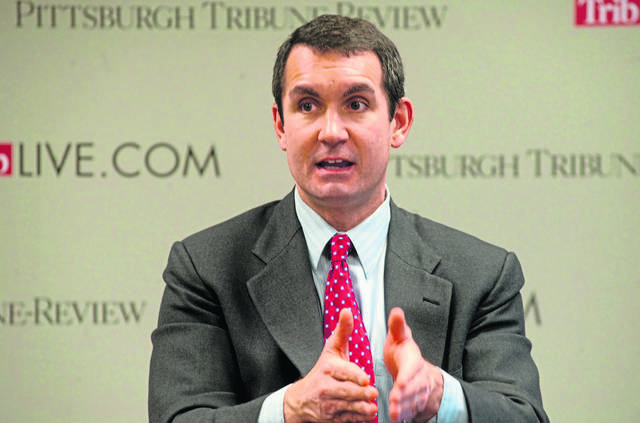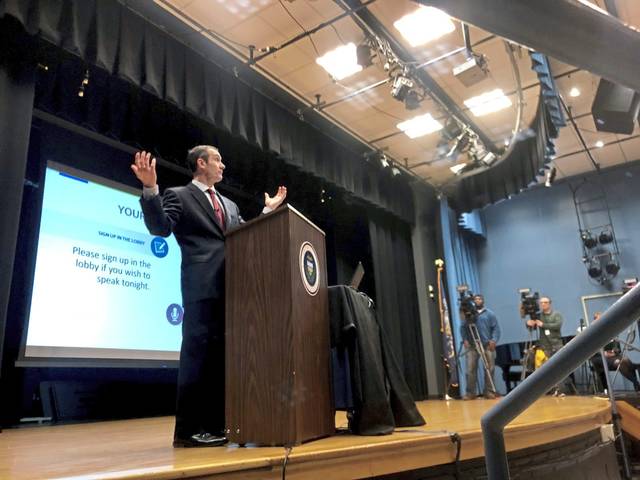Climate change and the severe weather events becoming increasingly common because of it are posing a threat not only to the quality of life of taxpayers but also their wallets, state Auditor General Eugene DePasquale said in a new report.
Pennsylvania racked up an estimated $261 million statewide in climate-related costs in 2018, according to DePasquale’s report, titled “Climate Crisis: The Rising Cost of Inaction.”
Roughly half of Pennsylvania’s 2018 costs cited in the report — $125.7 million — are tied to infrastructure-related damage caused by record-breaking flooding and landslides.
“The longer we fail to act, the greater the risks to our environment, our economy and our future,” DePasquale said Wednesday at a news conference where he presented the report at the state Capitol in Harrisburg.
The report was developed after consulting with more than 70 experts and dozens of studies and conducting public hearings in Pittsburgh, State College and Harrisburg. It called on state leaders to take charge in coordinating and investing in resources to help already cash-strapped municipalities confront climate-related challenges and needs.
While not every individual severe weather event can be attributed to climate change, rising global temperatures make it more likely for such events to become more frequent, according to scientists and a wide body of research. From June 2015 to June 2019, Pennsylvania recorded its wettest four-year period in history. The past five summers have been the state’s hottest on record.
Every $1 spent on preparing for natural disasters can save as much as $6 in recovery costs, according to research by the National Institute of Building Sciences.
DePasquale called on legislators to create a pot of money that PennDOT and other state agencies could draw from that existing federal aid does not cover. He called for dedicated funding to upgrade or replace outdated sewer systems, saying that Pennsylvania’s are among the oldest in the nation.
DePasquale also suggested increased use and improved availability of electric vehicles.
He cited the potential to save money in the long term by taking immediate steps to reduce emissions, improve air and water quality and better prepare for natural disasters. He said that doing so does not have to mean slashing jobs.
“By acting and investing now, we can not only save lives but also protect our economy and create jobs along the way,” DePasquale said.
House Environmental Resources and Energy Committee Chairman Rep. Daryl Metcalfe, R-Butler, issued a statement dismissing DePasquale’s report as a “fear-mongering” tool to further DePasquale’s political career. He accused DePasquale of “acting as the governor’s highest paid political cheerleader.”
“There was no actual auditing completed in this report,” Metcalfe said. “It all amounts to partisan pandering for the governor’s delusional climate change policy proposals.”
Pennsylvania is the fourth-largest emitter of greenhouse gases with “very few plans to help us improve that ranking,” DePasquale said. Nearly 90 percent of Pennsylvania’s greenhouses gases can be traced to electricity, transportation and the industrial and agricultural sectors.
“Yet, there is virtually no coordinated effort to reduce emissions” among them, DePasquale said.
The report did note that Pennsylvania’s power sector achieved a significant decrease in emissions from switching from largely coal to natural gas. DePasquale said that no other significant reductions were made.
Among concerns cited in the report:
• School officials are pondering spending millions of dollars for air conditioning in public school buildings amid prolonged heat waves. Equipping all Pittsburgh Public Schools with new cooling systems alone would cost $100 million.
• Rising sea levels could impact major shipping and transportation hubs, such as Philadelphia International Airport.
• Agriculture — everything from small and large farms to wineries growing grapes — is being shaken up by unpredictable growing seasons and weather events that affect food availability and costs.
• Public health risks related to mosquitoes, ticks and other disease-carrying insects and invasive plants have increased.
The report stated that just 15% of property owners who should purchase flood insurance actually have it and that share is declining. Meanwhile, places across the state are flooding where flooding historically has not been a problem. Meanwhile, the Federal Emergency Management Agency rejected requests to cover $63 million in damage related to public infrastructure statewide.
“However, because many people incorrectly believe that federal disaster assistance is always available, too little attention is paid to making proactive investments in mitigation,” DePasquale said. “The federal government cannot, and will not, bail us out after every severe storm.”











